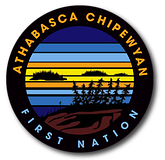FOR IMMEDIATE RELEASE
First Nations furious with governments weak response to massive contaminant spill in Athabasca River
November 21, 2013 Fort McMurray, AB – That Athabasca Chipewyan First Nation (ACFN) are seriously concerned with government inaction regarding the Sheritt Coal slurry spill that occurred on October 31st resulting in close to a billion litres of contaminant entering tributaries of the Athabasca River and eventually the Athabasca River itself. The Alberta government and the Alberta Energy Regulator waited three weeks to issue a clean up order and release information about the contents of the spill.
“We are furious with the Alberta Energy Regulator and governments for the lack of response for the largest spill in Canadian history. We are asking for the resignation of Minister McQueen and Gerry Protti for failing to do their job. For three weeks we have been living in uncertainty about the safety and level of contamination of our water systems. For us, it’s not just about our drinking water, it’s about our rights and culture,” stated Chief Allan Adam of the Athabasca Chipewyan First Nation.
The Wood Buffalo Regional Municipality decided only yesterday they would shut down the water intake at the water treatment facility and work with Sheritt to deliver clean, safe potable water to members of communities along the path of the plume.
Bruce Maclean from Maclean Environmental Consulting, a company that works with the local First Nations monitoring programs raised some serious concerns and stated, “Water quality data from the first days of the spill indicate many contaminants of concern to be above CCME guidelines, some 70 times above the guidelines. This includes PAHs, cadmium, arsenic, lead, selenium, silver, thallium, and even uranium. These numbers and contaminants represent real danger to human health and associated drinking water.”
Maclean also commented on the long term impacts of the settling of this sediment load and associated contaminants on fall spawning fish. “It will be difficult to assess without some serious sampling efforts, some of which may need to take place in the spring. We can assume that survival of fish eggs in the path of the plume will be compromised.”
The Nation asserts that the government failure to protect and safeguard the Athabasca river, the environment and eco-systems, equates to a failure to uphold the Canadian Constitution and Treaty and Aboriginal rights in the region. Treaty and Aboriginal rights to hunting, fishing, trapping and gathering rights are uniquely protected under the Canadian constitution.
“Government and industry continually ignore that our rights, our culture and our people rely on safe, clean eco-systems and waterways to continue our way of life,” stated Lorraine Hoffman, Councillor for the Athabasca Chipewyan First Nation. “We can’t keep the moose, caribou, bison, and fish from the contaminated plume as it travels downstream. This spill is just another example of both Alberta and Canada’s failure to protect the interests of not only First Nations, but the interests of all Canadians. Water is life, no matter who you are or where you are.”
Last year the federal government made sweeping changes to numerous environmental protection acts, however the Athabasca River was one of few rivers, lakes and oceans that maintained federal protected under the Navigable Protection Act. The ACFN is now questioning why the federal and provincial governments are allowing the continued abuse of this river system. To date there has been no contact with federal agencies about the implications of this spill.
“We have been raising concerns about the lack of safety and protection of the river and environment for years. This summer Dr. Timoney released a report Environmental Incidents in Northeastern Alberta’s Bitumen Sands Region outlining 9,262 industry incidents on the Athabasca river and how the government is failing to enforce environmental regulations. Now, the Athabasca is subject to the largest coal mine spill in Canadian history and it has taken governments three weeks to show any concern. Where is the federal protection? Something is seriously wrong with this picture,” stated Chief Adam.
In light of the new data, the Nation feels that a formal review of the official communication protocols around environmental disasters is needed. The huge lag time in reporting and overall lack of transparency and leadership has led the ACFN to take matters into their own hands. The ACFN will be launching their own sampling before, during and after the plume passes through their community.
-30-
For more information please contact
Eriel Deranger, ACFN Communications Coordinator 780-903-6598
